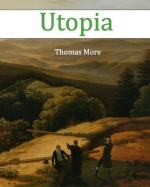pleasure, independent of all external objects of delight;
and though this pleasure does not so powerfully affect
us, nor act so strongly on the senses as some of the
others, yet it may be esteemed as the greatest of
all pleasures; and almost all the Utopians reckon
it the foundation and basis of all the other joys of
life, since this alone makes the state of life easy
and desirable, and when this is wanting, a man is
really capable of no other pleasure. They look
upon freedom from pain, if it does not rise from perfect
health, to be a state of stupidity rather than of
pleasure. This subject has been very narrowly
canvassed among them, and it has been debated whether
a firm and entire health could be called a pleasure
or not. Some have thought that there was no
pleasure but what was ‘excited’ by some
sensible motion in the body. But this opinion
has been long ago excluded from among them; so that
now they almost universally agree that health is the
greatest of all bodily pleasures; and that as there
is a pain in sickness which is as opposite in its
nature to pleasure as sickness itself is to health,
so they hold that health is accompanied with pleasure.
And if any should say that sickness is not really
pain, but that it only carries pain along with it,
they look upon that as a fetch of subtlety that does
not much alter the matter. It is all one, in
their opinion, whether it be said that health is in
itself a pleasure, or that it begets a pleasure, as
fire gives heat, so it be granted that all those whose
health is entire have a true pleasure in the enjoyment
of it. And they reason thus:—’What
is the pleasure of eating, but that a man’s health,
which had been weakened, does, with the assistance
of food, drive away hunger, and so recruiting itself,
recovers its former vigour? And being thus refreshed
it finds a pleasure in that conflict; and if the conflict
is pleasure, the victory must yet breed a greater
pleasure, except we fancy that it becomes stupid as
soon as it has obtained that which it pursued, and
so neither knows nor rejoices in its own welfare.’
If it is said that health cannot be felt, they absolutely
deny it; for what man is in health, that does not
perceive it when he is awake? Is there any man
that is so dull and stupid as not to acknowledge that
he feels a delight in health? And what is delight
but another name for pleasure?
“But, of all pleasures, they esteem those to be most valuable that lie in the mind, the chief of which arise out of true virtue and the witness of a good conscience. They account health the chief pleasure that belongs to the body; for they think that the pleasure of eating and drinking, and all the other delights of sense, are only so far desirable as they give or maintain health; but they are not pleasant in themselves otherwise than as they resist those impressions that our natural infirmities are still making upon us. For as a wise man desires rather to avoid diseases than to take physic, and




